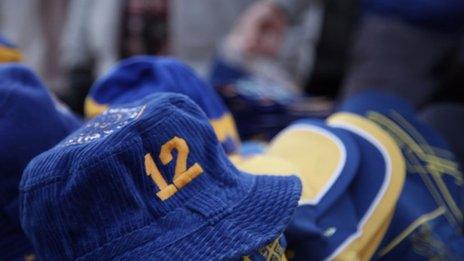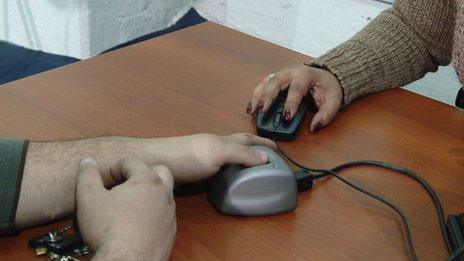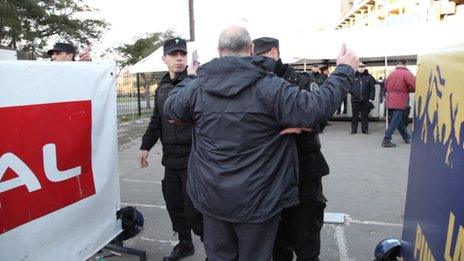Argentina struggles to curb football violence
- Published
Strict new rules will apply in all divisions of Argentine football
Argentines proudly claim that there are few sporting events that can rival a football match at the Bombonera, Boca Juniors' stadium in Buenos Aires.
Up to 50,000 people can fit into the 108-year-old stadium and it is often packed to the rafters with Boca Juniors fans dressed in their trademark blue and yellow colours, cheering the team they say is "the greatest club in America".
But during a recent match against Newell's of Rosario, the Bombonera also bore a reminder of the dark side of Argentine football.
A banner hanging from the stands carried a short but blunt message: "Murderer".
The sign was aimed at Rafael Di Zeo, a former leader of a group of hardcore Boca Juniors fans calling themselves La 12.
Some supporters blame him for the deaths of two men during a shootout in July, when hooligans fighting for control of La 12 opened fire on each other before a Boca away game.
Some 150 bullets were fired and the match had to be suspended. Many fans suspected Rafael Di Zeo was behind the incident and police are investigating the allegations.
Rafael Di Zeo has denied any involvement.
Two months on, the case still has not been solved and continues to create tension both inside and outside the Bombonera.
The head of Argentina's Federal Police, Roman di Santo, says he has received death threats for investigating some of the leaders of La 12 in connection with the shooting.
Shady dealings
According to the Argentine NGO Save Football, July's shootout is just the latest in a series of football-related killings.

The Barras Bravas are accused of selling counterfeit merchandise
The group says more than 70 people have been killed since 2000, three of them during this winter season alone.
And the most recent clashes seem to indicate that football violence is no longer just about rival fan groups having a go at each other, but increasingly over control of the shady businesses these gangs run.
Police say the Barras Bravas, as the football gangs are called here, run illegal touting schemes, selling tickets with a face value of $5 (£3) for up to $100.
They are also suspected of handling counterfeit club merchandise and of extortion, demanding payment in exchange for cheering for their own team.
Their influence also extends to the political scene, where they provide support for local politicians and trade union leaders, rallying their supporters to vote for particular candidates.
Red card
Speaking a day after the shootout in July, Argentine President Cristina Fernandez de Kirchner said club managers were not doing enough to stop the violence.
"Let's show a red card to certain sports authorities which still protect criminals and let this kind of thing happen," she said while waving a red card in front of a cheering crowd.
Boca Juniors President Daniel Angelici says he is doing the best he can. His club has already banned 146 supporters from the stands, the highest number to be blacklisted by any club in Argentina.
But he says that there is little he can do about fans who can prove they have a clean criminal record. Some well-known troublemakers still make it in.
"We will refuse them admission as soon as they violate any of our regulations," Mr Angelici tells the BBC.
He also advocates suspending matches when trouble starts. "No match is worth the life of a football fan," he says,
Away ban
A new system to prevent those with a criminal record from getting into the stands is also now being tested.
Before buying their tickets, supporters planning to attend any of the matches now must get an identity card with their biometric data and criminal record.

Football fans will have to carry the new card with their fingerprints
"Even the Pope will need to be registered in the system if he plans to see San Lorenzo playing," says San Lorenzo President German Lerche referring to the team's most famous supporter.
And the new ID card is not the only measure Argentina's National Football Association (AFA) has imposed as part of its efforts to tackle football violence.
AFA has also banned away fans from attending matches across the country. The measure applies to all divisions of Argentine football.
It is a radical move which according to Security Minister Sergio Berni has proved a success, making for a "quieter tournament".
But AFA argues it punishes the majority of peaceful fans for the behaviour of a small minority, and says it will gradually lift the ban.
'Football idols'
The ID card and the ban on away fans has received a mixed reaction from football supporters.
Carlos Gonzalez says it is a question of implementation rather than introducing extra checks.

Some fans think better implementation of existing security measures is key
"There are so many measures already, a club member card, police at the gates, security turnstiles, they should be able to stop the radicals already if they want to," he says as he is getting fingerprinted for the new ID card.
Liliana Suarez, whose 19-year old son Daniel was stabbed to death by Argentina fans during an international against Chile in 1995, also thinks a lack of political will is the problem.
"Without real political commitment this is not going to change," she says.
She is speaking from bitter experience. Eighteen years after Daniel's death, no-one has been convicted of the crime.
"At the end of the day, the Barras Bravas are only the weakest link in a powerful chain that includes the club authorities, who grant them protection, and complicit police and politicians," she says.
But Boca Juniors fan Esther Fernandez thinks the problem runs even deeper.
"For decades society allowed these people to become who they are now, in a position where being a Barra is something to be proud of, like being a football star," she says.
"Now we are paying the price."
- Published12 June 2013
- Published12 December 2012
- Published27 June 2011